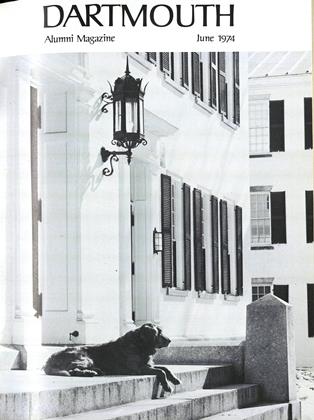1973, Gregory Prince, Assistant Dean of the Faculty at Dartmouth, stopped in Toronto to give us a report on recent developments at the College. He mentioned that a group of language experts from the People's Republic of China was on campus during Thanksgiving. In spite of the holiday, the visitors insisted on learning all about the language program, and several seminars were held on the holiday. He commented that the Chinese were indeed a very hard working group. As he told us this, we could not help but reflect on similar experiences that we had encountered in China between June 21- July 24, 1973, when our hosts would plan daily schedules for us during those five weeks to visit communes, hospitals, medical schools, factories, schools, nurseries, and other institutions.
The eight of us who went (four men and four women trained in law, nutritionhealth education, psychology, biostatistics, political science, sociology, film editing, and communications and media) had a very specific purpose of making a 16 mm. color documentary film on the functions of barefoot doctors. Besides this, each of us had our personal reasons for going. We are all Chinese Americans, four born in China, two in Formosa, and two in the United States, and now connected with various academic institutions.
My wife and I have worked in the health area for some time. Mary, a biostatistician, has specialized in population and demography and was connected with a project on family planning in Ludhiana, India, some time ago. I have been involved in health research for 20 years, and completed a study on citizen participation in U.S. neighborhood health centers before moving to Canada. Lectures by two physicians from the People's Republic on public health and the use of acupuncture as analgesia stimulated our interest in learning first hand the current health advances that have been made. Through a series of circumstances, we subsequently met Victor H. Li, Associate Professor of Law at Stanford, who became the leader of our group, and his wife, Diane, a film-editor. After our group assembled in Hong Kong, we negotiated with the China Travel Service to go to only a few places and stay a longer period of time, rather than follow the usual tourist schedule of two days here and three days there. It quickly became evident that scheduling is not the easiest because at each location our hosts had to check with the next place to see if there were sufficient accommodations. We did visit Canton from June 21-24, Shanghai from June 25-July 1, Hangchow from July 2-7, Peking from July 8-17, and Shen Yang (in Manchuria) from July 18-24. From Shen Yang we returned directly to Canton and reached Hong Kong on July 26.
At each of these places, we had a fairly standard routine: breakfast at around 7 a.m.; an on-site inspection in the morning; lunch and rest; and at 2 p.m. another inspection tour. The evenings were "free," although often we were taken to some cultural events. At first, we were eager to visit a variety of places, but gradually the visits focused on places where barefoot doctors worked, in neighborhood areas and on communes. Often, several visits were made to the same place, so that we could collect more information.
 View Full Issue
View Full Issue
More From This Issue
-
 Feature
FeatureEducation in the Round
June 1974 By ANDREW J. NEWMAN AND MELANIE FISHER -
 Feature
FeatureChina's Barefoot Doctors
June 1974 By PETER KONG-MING NEW AND MARY LOUIE NEW -
 Feature
FeatureCASTLES ON THE CONNECTICUT
June 1974 By JAMES L. FARLEY -
 Feature
FeatureO Pioneers
June 1974 -
 Feature
FeatureRetiring Professors
June 1974 -
 Article
ArticleRetirement: Plan It and Enjoy
June 1974 By RICHARD S. BURKE '29
Article
-
 Article
ArticleThe Waiting Opportunity
JUNE, 1927 -
 Article
ArticleON THE ACADEMIC FRONT
October 1960 -
 Article
ArticleWITH THE BIG GREEN TEAMS
FEBRUARY 1963 -
 Article
ArticleGive a Rouse for
OCTOBER, 1908 -
 Article
ArticleDenver
MARCH 1971 By EVERETT H. PARKER '16 -
 Article
ArticleDARTMOUTH AND THE SECONDARY SCHOOLS
February 1916 By James L. McConanghy

